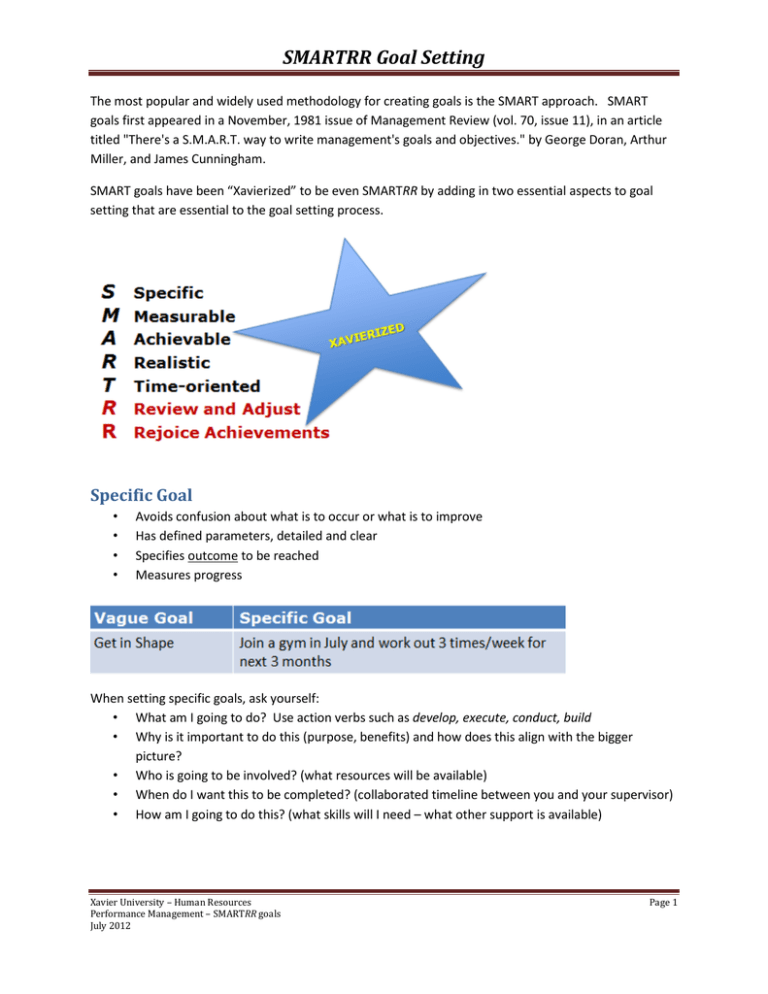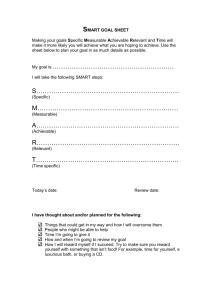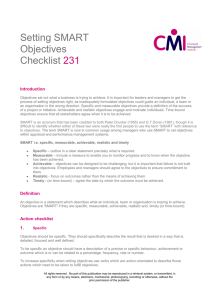SMARTRR Goal Setting
advertisement

SMARTRR Goal Setting The most popular and widely used methodology for creating goals is the SMART approach. SMART goals first appeared in a November, 1981 issue of Management Review (vol. 70, issue 11), in an article titled "There's a S.M.A.R.T. way to write management's goals and objectives." by George Doran, Arthur Miller, and James Cunningham. SMART goals have been “Xavierized” to be even SMARTRR by adding in two essential aspects to goal setting that are essential to the goal setting process. Specific Goal • • • • Avoids confusion about what is to occur or what is to improve Has defined parameters, detailed and clear Specifies outcome to be reached Measures progress When setting specific goals, ask yourself: • What am I going to do? Use action verbs such as develop, execute, conduct, build • Why is it important to do this (purpose, benefits) and how does this align with the bigger picture? • Who is going to be involved? (what resources will be available) • When do I want this to be completed? (collaborated timeline between you and your supervisor) • How am I going to do this? (what skills will I need – what other support is available) Xavier University – Human Resources Performance Management – SMARTRR goals July 2012 Page 1 SMARTRR Goal Setting Measurable Goal • • Includes a deadline Defines quantity, cost or quality When setting measurable goals, ask: • • What measurements can I use? How will I know when it is accomplished (what tangible evidence do I have)? Achievable Goal • Challenging but accomplished within reasonable timeframe When setting achievable goals, ask: • Do I have ability or skill or talent or even the discipline to achieve that goal? Realistic Goal • • Challenging but attainable • Resources available (skills, funding, tools, staff) Unrealistic goals set employee up for failure Xavier University – Human Resources Performance Management – SMARTRR goals July 2012 Page 2 SMARTRR Goal Setting Time Oriented Goal • Target date defined • Creates urgency and leads to action • Achievable • Realistic • Complex Goal? – break into multiple target completion dates When setting time oriented goals, ask: • What is the earliest yet achievable and realistic date for this goal to be completed? • Have I included this date in the statement of the goal (for my commitment)? Review and Adjust • Periodic review of goals • Adjust as needed Reasons for adjusting goals: • Prerequisite to your goal is not completed • Others have not completed their tasks which pushes your goal framework back • Initial goal was too aggressive Rejoice in Achievements • • • Achieving a goal creates a sense of satisfaction and well-being Supervisors should acknowledge and celebrate their employees' achievements by providing praise and positive feedback in a goal review meeting; and in instances where significant collaboration occurred, celebration as a team may be most appropriate Supervisors should share appropriate achievements with the rest of the team to help motivate them Xavier University – Human Resources Performance Management – SMARTRR goals July 2012 Page 3



